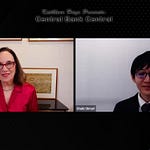Rob Kaplan would have voted for the Fed’s 25 bps rate cut yesterday if he were still president of the Federal Reserve Bank of Dallas. The recent decline in inflation set the stage for one last rate cut in 2024, but the recent bounce back up in key measures put the wisdom of that move in question. He says it would have been a very tough, very close decision, and he could just have easily vote for a pause instead of a cut if Chair Powell and enough other members of the the policy making Federal Open Market Committee had been ready to vote for that.
Now he says the Fed needs to have confidence that inflation is back on its downward trajectory before it even considers doing another rate cut which could be difficult with very stimulative fiscal policy in place. “And you’ve heard me say this over and over again the last couple of years: fiscal policy is historically stimulative and it’s not surprising to me that inflation progress is stuck…”
So listen to what this former Fed policy maker and current vice chair of Goldman Sachs has to say. It’s about much more than the Fed’s next policy move. It’s about big forces that are already in play and now their resolution or lack there of could affect the forces that be driving them this year.
Kaplan- Had I been voting at this meeting - 00:00:59.200 --> 00:01:26.979
I would have gone into this meeting with an open mind about whether or not to cut rates. I think this is a very tough decision, and I would have found it to be a very tough decision. I would have gone along with the rate cut. I wouldn't have dissented, but I would also been very receptive if J-Powell and enough others had wanted to pause in this meeting and not cut, I would have been happy with that. It's one of those meetings where I was you know, 55 45 hesitant, but I would go along with the others.
What markets expected…00:00:42.790 --> 00:00:53.499
<The Fed> gave us what expected, maybe a little less friendly to the markets. They didn't really like the fact that the fed cut back on the number of rates expected. Did they do the right thing.
No surprise that inflation progress is stuck- 00:03:45.630 --> 00:04:30.589
… it's stuck for a very important reason, in my opinion, which is fiscal policy. And you've heard me say this over and over again the last couple of years. Fiscal policy is historically stimulative. And it's not surprising to me that inflation and progress is stuck when… you're running deficits of 6 and a half percent plus of GDP. And you got these big infrastructure act inflation reduction act, chips act projects, going on. Yeah, it's not a surprise that we're not seeing more progress. And so if there's starting to be disagreement, I'm actually encouraged by that, there ought to be.
Change is in gear- 00:05:38.740 --> 00:06:10.629
…things are going to change. The approach to fiscal spending is going to change. These big spending programs are liable to be paused. We'll have to see you're going to have regulatory review economy wide. You're going to have a change in the energy ecosystem and energy transition policies with a purpose to try to lower the cost for low, moderate income families… you're going to have a tariff policy which is unclear at this point
Tariffs Manageable or not? 00:06:11.720 --> 00:06:27.740
…it might be manageable depends on how they do it. But what I, what I particularly want to know is, are you going to put tariffs, not just on China, but also on Mexico. It's on Mexico. That's a problem.
On Deportations- 00:07:06.860 --> 00:07:17.910
…and we are going to have deportations. We're going to seal the border fair enough. The question is, how far will the deportations go? And are you going to reduce.
Against this background the Fed should… 00:07:38.720 --> 00:08:01.379
… the Fed should wait here and give some time for these puzzle pieces to clarify. That's another reason to pause, but my first reason for pausing is inflation. Progress is now stuck, but I think it's a little too sticky to be cutting further.
The shift form cyclical to structural policy -00:09:05.450 --> 00:09:25.990
…post Covid was a good example. As we got into 2021, the structural policy shifted much more government spending, for example, beyond just the Cares act. I think sometimes the fed can be slow to recognize those structural shifts
Fiscal spending alters monetary benchmarks- 00:13:03.950 --> 00:13:15.930
But the fact of the matter, and I don't expect this extraordinary level of fiscal spending to continue so. I can make an argument in my mind. The fed is still somewhat restrictive.
The data isn’t enough- 00:15:24.930 --> 00:16:48.800
But we're definitely at this point. The data isn't enough. Okay, so what I mean by the data isn't enough even before the structural changes. What I've said to you is one of the structural drivers…, if you told me, government spending is now going to stand down. I don't know if that's going to happen. By the way, I know there's talk about it, and we're going to get more to deficits, more like 5% of GDP, not 6 and a half. These big spending programs are going to be stood down. That, to me, is a big structural change that actually encourages me..<but> you’ve got to combine the structural with the cyclical.
Policy at a pivot point without clarity 00:23:36.390 --> 00:24:06.389
…we're now at a pivot point where there was probably room, I think, in the fall I felt I was confident there was at least 75 basis points, room to cut, maybe a hundred. In other words, we could get probably to 4 and a quarter, 4 and a half, maybe 4 and a half to 4 and 3 quarters. I thought, 4 and a half quarter 4 so fine, the September meeting more comfortable the November meeting more comfortable. Now we're getting to where that phase is over, and it is unclear.
High inflation has taken a toll- 00:26:06.700 --> 00:26:23.420
above trend inflation for 4 years has taken its toll on low, moderate income, families who are struggling to make ends meet, which my own estimate and these are not never precise. Numbers 65 to 70 million workers make 55 grand a year or less. They are struggling to make ends meet. They're working second jobs. Their kids in at risk.<In some> communities <students> are dropping out of high school to help the family.
Like it or here’s what helped on inflation: 00:27:56.900 --> 00:28:16.130
Whether we like it or not, the immigration surges. I don't like the way it's happened, and I'm glad we're going to get it under control, but that's helped create disinflation. China manufacturing overcapacity has been a big help. Whatever the Fed did to create disinflation <there were these forces, too>.
Connecting the dots on policies for Trump… 00:33:19.840 --> 00:34:01.430
…if you're going to have tariffs and you want to induce more domestic production, you need workers. You know every answer to all these issues. If you want to deleverage at the Federal Government level, you need GDP growth. You can't rely completely on productivity growth. You need some workforce growth. And so how they calibrate the deportation strategy, whether we have, in addition, legal immigration being bolstered. You tell me what workforce growth is for 2025. I'll have a lot firmer view on what, how this puzzle is going to fit together.
So dive in, and see, hear what Rob has to day. And remember besides listening you can read along what he has to say.
Rob Kaplan is Vice Chairman of Goldman Sachs and a member of the Management Committee. Previously, Mr. Kaplan served as President and CEO of the Federal Reserve Bank of Dallas. Before joining the Fed, he was the Martin Marshall Professor of Management Practice and Senior Associate Dean at Harvard Business School (HBS).
Mr. Kaplan initially joined Goldman Sachs in 1983 and became a Partner in 1990. In 2002, he became Vice Chairman of the firm with global responsibility for the Investment Banking and Investment Management Divisions. He also served as Co-Chair of the Partnership Committee and Chair of the Goldman Sachs Pine Street Leadership Program. In 1998, Mr. Kaplan became Global Co-Head of Investment Banking and a member of the Management Committee. His previous roles included serving as Head of Asia Pacific Investment Banking, Co-Chief operating officer of global Investment Banking and Head of the Americas Corporate Finance Department.
Mr. Kaplan retired from the firm in 2006 to join HBS, becoming a Senior Director at that time.
Mr. Kaplan is Chairman of Project ALS and Co-Chairman of the Draper Richards Kaplan Foundation. He is a board member of Harvard Medical School and St. Mark’s School of Texas, and is a member of the George W. Bush Institute’s Advisory Council. He is also an Advisory Board member of the Baker Institute. He serves on the Bipartisan Policy Center President’s Council and on the Board of Directors at The Holdsworth Center.
Mr. Kaplan is the author of three books on leadership, What You Really Need to Lead, What You’re Really Meant To Do, and What to Ask the Person in the Mirror.













Share this post